Monk fruit is becoming the new go-to alternative sweetener, holding its ranks and even rising above some of the current favorites. This post will give you all the info and will highlight 5 fantastic benefits of monk fruit!
Monk fruit is an up and coming sweetener. It has been around for ages, but is just recently being touted as a replacement for sugar (and a great one at that).
Y’all know I’m a big believer in quitting sugar and an advocate for clean eating all of the time. Sure, I’ll indulge now and then and take a “cheat day,” but honestly, I prefer to stay on track because I feel more energetic and healthy when I do. Not only do I just feel better physically, but the truth is, there are tons of foods out there that are not processed and not full of hidden sugars.
So, let's dive into the benefits of monk fruit and why it’s so good.
WHAT IS MONK FRUIT?
Monk fruit is a melon that was grown and enjoyed long ago by Buddhist luóhàn monks. This small, green fruit grows in southern China, and that is where it is enjoyed in fresh form. It’s mainly used in teas and for medicinal use.
In North America, we typically see monk fruit in dried form. That is how the monk fruit sweetener is made — it is dried. Monk fruit is first crushed, the resulting juice is dried and then made into a concentrated powder for sweetening. These compounds are called mogrosides and are very sweet.
It’s important to know that monk fruit is expensive to import and therefore, is pricey to buy. It’s not always easy to find either, but once you find a store that carries it, you are all set.
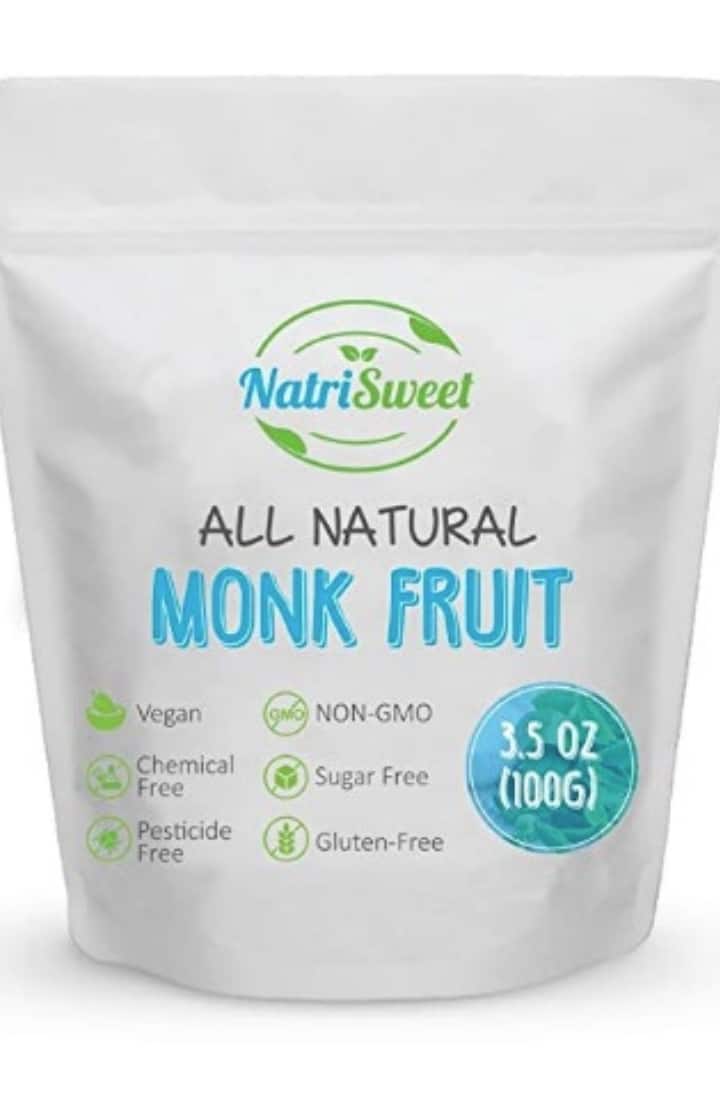
WHY USE MONK FRUIT?
Monk fruit has zero calories. That’s one reason why it is used as a sweetener. It is not known to cause bloating like (sorbitol and xylitol) and is generally recognized as safe by the U.S. Food and Drug Administration. Also known as Luo Han Guo, monk fruit is used as a flavoring, and even as a sweetener in some baby formulas.
Remember though, if you want to lead a healthy lifestyle, lose weight, or just keep your caloric intake in check, an all-around healthy diet, plenty of sleep, time in the fresh air, and exercise are important. These practices, along with using a sweetener (or a sugar substitute) to reach your goals, is the healthy way to go about it.
PROS OF MONK FRUIT
There are many reasons to use monk fruit as opposed to sugar as a sweetener:
- There are no side effects to using monk fruit
- Monk fruit can be purchased in packets or in bulk
- Monk fruit has no sugar
- The calorie count of monk fruit is zero
- There are no carbs in monk fruit
- Monk fruit is suitable for diabetics, vegans, and those on the keto diet
- Monk fruit is palatable, more so than other sweeteners
- Many people who are taking care to use a substitute like monk fruit instead of sugar, will also be careful about the rest of their diet and lifestyle
IS TOO MUCH MONK FRUIT BAD FOR YOU?
There are not a lot of studies out there on monk fruit, but there is documentation of a 90-day animal trial, whereby no toxic effects were seen when monk fruit was administered in a liquid. The conclusion was determined by several testing methods, including urinalysis and blood work.
However, there is no harm in discussing the use of monk fruit with your doctor or a nutritionist to make sure it’s a good choice for you.
All that to say, as with any food, alcohol, and even exercise, moderation and not overdoing it is key.
To note, there has not yet been an ADI (accepted daily limit) set for monk fruit.
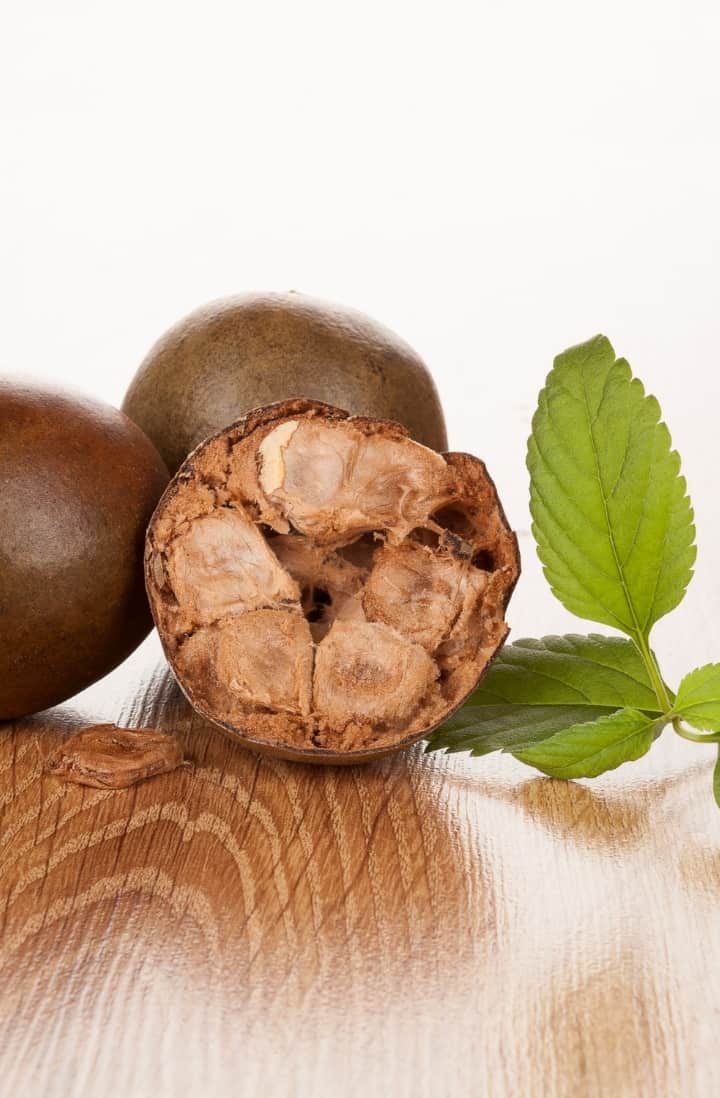
DOES MONK FRUIT CAUSE DIGESTIVE ISSUES?
Monk fruit is not thought to cause digestive issues, but like any food, there is always a chance of an allergic reaction. It is part of the gourd family, so if you have sensitivity to foods like melons and squash, you may have an issue. If your stomach is upset after trying monk fruit sweetener, you may make the decision it is not for you.
WATCH FOR ADDED INGREDIENTS IN MONK FRUIT SWEETENER
Any sweetener you buy out there may have added ingredients. Why is this? Well, with monk fruit, it is over 200 times sweeter than sugar and because of this, products like erythritol may be added to reduce the sweet flavor profile somewhat.
As well, the taste of monk fruit is not agreeable to some people, and for that reason, dextrose, or maltodextrin are sometimes added to change the taste.
You may see a packet of monk fruit sweetener and think that it’s 100% monk fruit. But, be careful because, to increase the volume, other non-caloric ingredients may be added.
These ingredients may not agree with you or may be medically unsafe (in the case of diabetes, for example), so best to make sure you are consuming monk fruit only.
IS MONK FRUIT SAFE FOR DIABETES?
Monk fruit is said to be safe for diabetics. Studies show that it is a fruit low on the glycemic index and the mogrosides found in the fruit have a positive impact on stimulating insulin secretion. It’s absolutely necessary though, to check the label of the monk fruit sweetener to make sure there are no other ingredients added.
DOES MONK FRUIT BREAK A FAST?
Monk fruit will not break a fast. Because there is no sugar, it does not cause a sugar spike, which normally breaks a fast.
So, those of us who follow an intermittent fasting regimen don’t have to worry about monk fruit breaking a fast. However, studies are limited on the subject. There is documentation that monk fruit may stimulate insulin secretion, but the jury is still out as to whether the action is enough to break the fast.
I personally stick to water with apple cider vinegar when in a fasting period. You can also drink coffee or tea when fasting, but to be sure I do not break a fast, I avoid adding anything to them — it’s black coffee and tea for me.
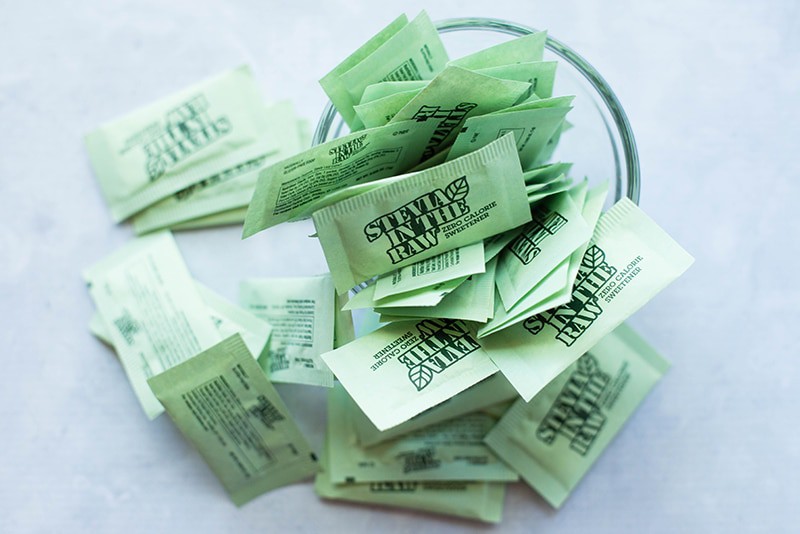
MONK FRUIT VS OTHER SWEETENERS
Monk fruit vs stevia
- Stevia has zero sugar, carbs and calories, like monk fruit
- Stevia is less expensive to buy than monk fruit sweetener
- Is sometimes mixed with sugar alcohols like maltitol, so may cause digestion issues
Monk fruit vs erythritol
- Erythritol is derived from sugar and is called a sugar alcohol
- Sugar alcohols can cause digestive issues, whereas monk fruit does not
- Erythritol is often added to monk fruit, so check your labels
Monk fruit vs sucralose
- Sucralose is processed from table sugar while monk fruit is derived directly from the fruit
- Sucralose can cause bloating and gas
- Sucralose can be used in baking like monk fruit
Monk fruit vs aspartame
- Aspartame contains 4 calories per gram
- Aspartame is often blended with a carb so a packet is equal in volume to a packet of sugar
- Aspartame is not commonly used in baking whereas monk fruit can be used
IS MONK FRUIT CLEAN?
Whether monk fruit is clean or not is a tricky question. If you are buying a product to bake with for example, and it is produced to measure cup for cup with stevia, to do so, other ingredients need to be added (like dextrose and maltodextrin).
Although dextrose is derived from corn and is considered natural, it is processed sugar and has calories. Simple monk fruit sweetener does not.
In a nutshell, if the product you buy is pure monk fruit extracted to liquid or powder, it’s clean.
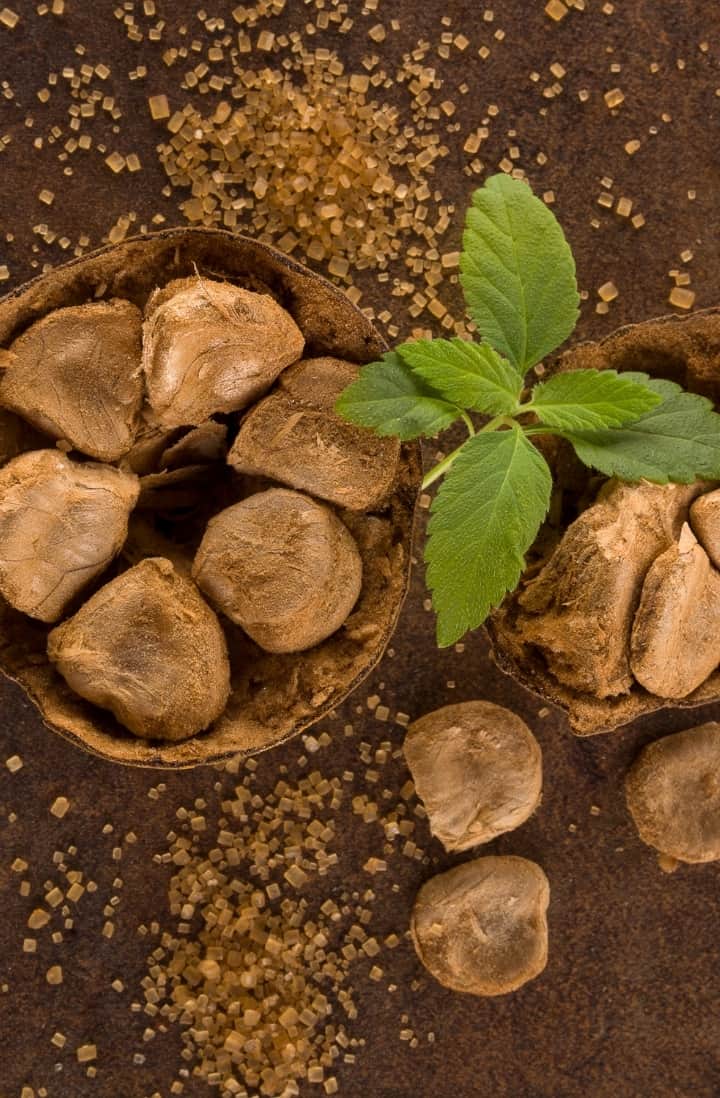
5 IMPRESSIVE BENEFITS OF MONK FRUIT
1. MONK FRUIT IS ANTI-INFLAMMATORY
With all of the knowledge we have that inflammation causes a lot of issues, it is good to know that monk fruit aids against inflammation. It’s the mogrosides that have the anti-inflammatory effect.
2. MONK FRUIT MAY HAVE ANTI-CANCER PROPERTIES
As mentioned before, monk fruit is one of the new kids on the block when it comes to research. More studies are underway, however, and a it has been concluded that the mogroside IVe in monk fruit suppressed the growth of both colorectal and throat cancer cells. Pancreatic cancer is another example where monk fruit proved promising.
3. MONK FRUIT MAY HELP WITH WEIGHT LOSS
Because monk fruit has zero calories and no carbs, using it to sweeten your food instead of sugar may help you lose weight. Rather than adding table sugar to your coffee or cookie recipe, try monk fruit.
4. MONK FRUIT MAY HAVE ANTI-OXIDANT PROPERTIES
A study showed that the mogrosides in monk fruit had an anti-oxidant effect in pancreatic cells (specifically cells under stress due to type 2 diabetes).
5. MONK FRUIT IS SAFE FOR DIABETICS
Because monk fruit does not increase blood sugar levels, it is safe for diabetics. Remember though, that monk fruit may be blended with other ingredients to increase the volume for packaging. Always check the label.
MORE HEALTHY FOODS WITH ADDED NUTRITIONAL BENEFITS
Now that you know a little more about monk fruit, it’s time to read up on the great benefits of other foods in your pantry:
- 10 Surprising Benefits of Flaxseed Meal
- 10 Benefits of Eggs and Why You Should Eat Them More Often!
- 11 Crazy Awesome Benefits of Chia Seeds
- 10 Benefits of Green Tea | Why You Should Drink It Every Day!
- 9 Awesome Benefits of Collagen
- 12 Amazing Benefits of Ginger
- 10 Amazing Benefits of Turmeric: More Thank Just For Inflammation!
- 11 Proven Health Benefits of Chocolate: Is It OK To Eat Chocolate Every Day?
This post contains affiliate links for products I use regularly and highly recommend.

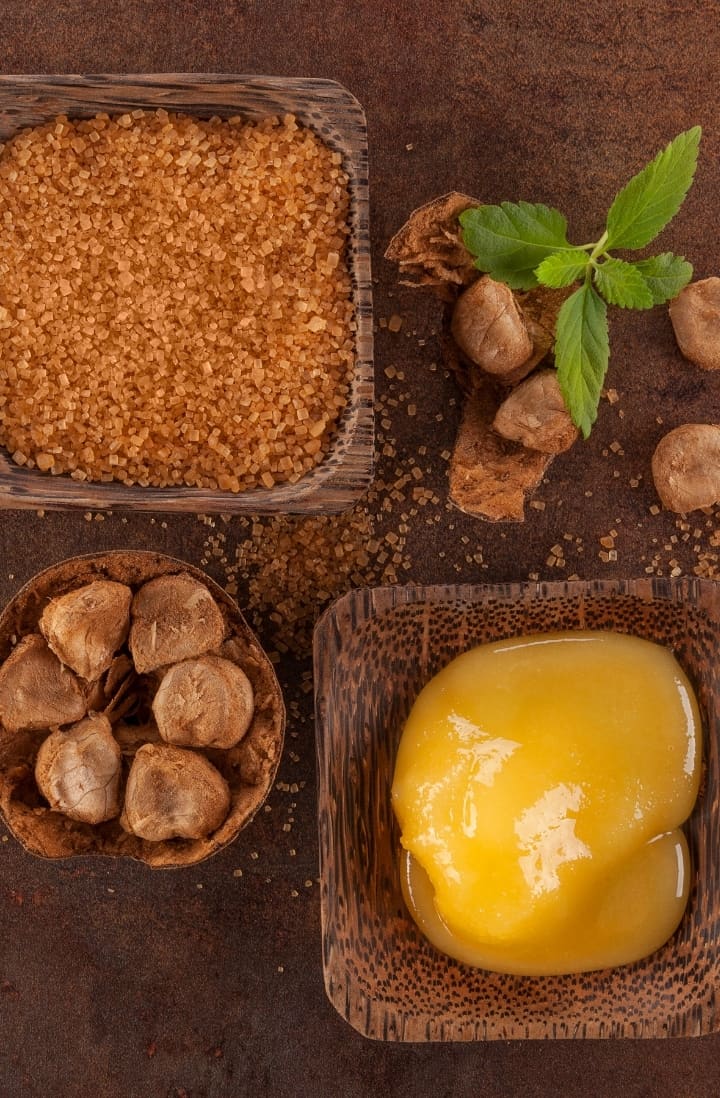

Comments
No Comments